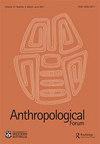以女性为中心,反对杀戮:女性牺牲,神圣的母性和与泰米尔印度教女神的亲密关系
IF 0.7
3区 社会学
Q3 ANTHROPOLOGY
引用次数: 0
摘要
有些牺牲是宇宙形成的行为。在(重新)创造世界的同时,他们通过仪式性地占有和超越女性的肉体生殖能力,创造了男性的社会纽带。从这些以男性为中心的表述出发,本文考虑了女性牺牲的时间、原因和方式(不同)。我将新加坡的母亲/助产士女神佩里雅奇(peryacci)与印度泰米尔纳德邦(Tamil Nadu)农村父系以男性为中心的守护神献祭进行了比较。关注女性作为积极的仪式赞助者和献祭者,而不是像通常那样,仪式上被禁止和象征性地诋毁的对象,我仔细审查了关于生殖的献祭公开的神学,仪式和伦理要求。女性天生的生育能力,习惯上被贬低为违背直觉地将生育定位在男人和他们的监护人之间的牺牲契约中,集中在佩里亚奇的崇拜中。沉湎于身体及其脆弱、失败和不育,女性主导的牺牲表明,只有通过女性,生活才有可能。女性实际牺牲自己的身体和劳动来有机地产生和养育生命,这否定了动物替代品戏剧性的象征性牺牲的必要性。佩里亚奇的崇拜把身体和精神、祭祀和生存、仪式和例行公事纠缠在一起,为思考祭祀及其创造性的必要性提供了另一种方式。献祭不必是壮观的事件,也可以是日常的圣礼。本文章由计算机程序翻译,如有差异,请以英文原文为准。
Centreing Women, Countering Killing: Women Sacrificing, Sacralising Maternity and Substantiating Intimacy with a Tamil Hindu Goddess
ABSTRACT Some sacrifices are cosmogonic acts. Along with (re)creating the world, they create male social bonds by ritually appropriating and transcending women’s corporeal reproductive powers. Departing from these androcentric representations, this paper considers when, why and how (differently) women sacrifice. I compare an exclusively female domestic worship to the mother/midwife goddess Periyacci in Singapore from which men are forbidden with a male-centric sacrifice to tutelary deities by a patrilineage in rural Tamil Nadu, India. Focusing on women as active ritual sponsors and sacrificers, rather than as is usual, ritually prohibited and symbolically denigrated objects, I scrutinise sacrifice’s avowed theological, ritual and ethical claims regarding reproduction. Women’s native fertility, customarily denigrated to counterintuitively locate reproduction in the sacrificial covenant between men and their tutelaries, is centred in Periyacci’s worship. Dwelling on the body and its frailties, failures and infertility, women-led sacrifice demonstrates that life is only possible through women. Women’s actual sacrifice of their own bodies and labours to organically generate and nurture life negates the need for the dramatic symbolic sacrifice of animal surrogates. Entangling body and mind, sacrifice and subsistence, ritual and the routine, Periyacci’s worship offers alternative ways of thinking about sacrifice and its creative imperatives. Sacrifice need not be spectacular event but can also be an everyday sacrament.
求助全文
通过发布文献求助,成功后即可免费获取论文全文。
去求助
来源期刊

Anthropological Forum
ANTHROPOLOGY-
CiteScore
3.60
自引率
10.00%
发文量
14
期刊介绍:
Anthropological Forum is a journal of social anthropology and comparative sociology that was founded in 1963 and has a distinguished publication history. The journal provides a forum for both established and innovative approaches to anthropological research. A special section devoted to contributions on applied anthropology appears periodically. The editors are especially keen to publish new approaches based on ethnographic and theoretical work in the journal"s established areas of strength: Australian culture and society, Aboriginal Australia, Southeast Asia and the Pacific.
 求助内容:
求助内容: 应助结果提醒方式:
应助结果提醒方式:


